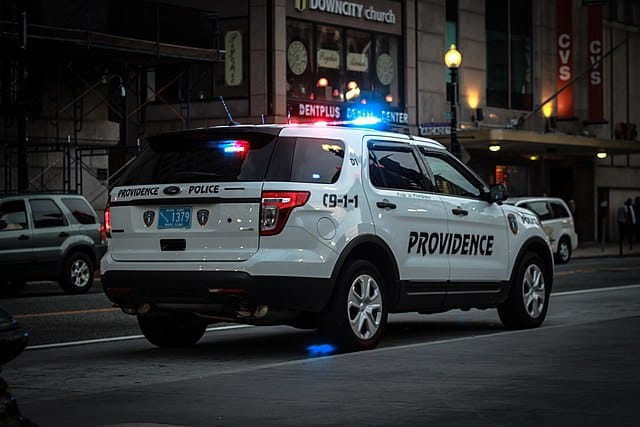New study shows racial disparity in Rhode Island traffic stops
A new analysis of law enforcement traffic stops found that a “total of 11.4 percent of motorists stopped were observed to be Black and 13 percent to be Hispanic. The analysis found that stopped motorists were more likely to be perceived by the stopping officers as minorities during daylight relative to darkness suggesting the existence of a racial or ethnic
April 27, 2018, 1:02 pm
By Steve Ahlquist
A new analysis of law enforcement traffic stops found that a “total of 11.4 percent of motorists stopped were observed to be Black and 13 percent to be Hispanic. The analysis found that stopped motorists were more likely to be perceived by the stopping officers as minorities during daylight relative to darkness suggesting the existence of a racial or ethnic disparity in terms of the treatment of minority motorists relative to white motorists.”
Conducted by Central Connecticut State University (CCSU)’s Institute for Municipal and Regional Policy (IMRP), the analysis studied traffic stops by 37 municipal police departments, the Rhode Island State Police (RISP), the University of Rhode Island (URI) and the Department of Environmental Management (DEM). The analysis is mandated under thee recently passed Comprehensive Community-Police Relationship Act (CCPRA), which “requires the Rhode Island Department of Transportation (RIDOT) to be the recipient of data from police departments throughout the state regarding traffic stops. RIDOT does not analyze this data or draw conclusions from it.”
A group of stakeholders that included both police departments and community members met regularly over the time the data was collected and provided input on the analysis of the data. Those stakeholders include; Rhode Island for Community and Justice (RICJ), Rhode Island Commission for Human Rights (RICHR), Rhode Island Police Chiefs Association (RIPCA), Rhode Island State Police, and American Civil Liberties Union (ACLU) of Rhode Island.
“One uniquely positive aspect of this research is the collaboration between community and police who meet regularly to advise the study process and discuss results,” said Toby Ayers, Executive Director, Rhode Island for Community for Justice. “While five departments will be studied in depth, we recognize that many departments’ data revealed disparities at lesser levels. Ongoing dialogue between our groups will be helpful as departments examine how policies and practices affect policing ‘on the ground.’ It is important that community voices continue to be included as Rhode Island works to understand the reasons for racial and ethnic disparities in stops and searches, and how to reduce them.”
“The Rhode Island Commission for Human Rights is honored to have been a participant in the police-community dialogue in respect to racial profiling for over two decades,” said Michael Evora, Executive Director, Rhode Island Commission for Human Rights. “While the 2016 Report identifies four municipal departments and one state police barracks as having more statistically significant racial and ethnic disparities in stops and searches, the Commission encourages the examination of policing patterns and practices by all departments with identified disparities, in furtherance of the goal of ensuring that all motorists on Rhode Island roads are treated equally.”
“It is both sobering and discouraging to read yet another report documenting clear inequalities in the enforcement of traffic stop laws by police departments in the state. It has been almost two decades since community groups first persuaded the General Assembly that the problem of racial profiling deserved investigation and action,” said Steven Brown, Executive Director, American Civil Liberties Union of Rhode Island. ” The sincere cooperation by police chiefs in this study is reassuring, but there must be a renewed effort to systematically root out this problem and adopt procedures to eliminate continuing racial disparities in the treatment of motorists. Our state’s commitment to equality under the law demands no less.”
According to RIDOT, the analysis “also found that Rhode Island police departments exhibited a tendency to be less successful finding contraband in motorist searches involving minority drivers. There are no clear links in these observed disparities to racial profiling as they may be driven by any combination of policing policy, heterogeneous enforcement patterns, or individual officer behavior.”
“We first try to answer the question, do racial and ethnic disparities exist in traffic stop and search data?” said Ken Barone, CCSU’s IMRP project manager. “This analysis shows that Rhode Island has racial and ethnic disparities in its traffic stop and search data. However, the more challenging question to answer is, what are the factors contributing to those racial and ethnic disparities?”
Four municipal departments, Cranston, Narragansett, North Smithfield and Providence, and the Hope Valley Rhode Island State Police Barracks, exhibited statistical disparities that warrant further analysis.
RIDOT cautions that “There are many reasons for disparities to exist. By examining factors such as the location of crashes, calls for service records, crime patterns, and areas of major traffic generators, law enforcement administrators and the public will gain a better understanding of the nature of policing and the variety of factors that influence traffic enforcement in each individual community.
RIDOT continues, “All four departments and the one state police barracks identified in the report have already met with IMRP researchers to begin examining the factors that may be contributing to racial and ethnic disparities. It is during this part of the process that policymakers, citizens and law enforcement can best come together to understand and address the disparities present in those departments’ traffic stops. A full follow-up report with findings and recommendations for each identified department will be published in the coming weeks.”
UpriseRI is entirely supported by donations and advertising. Every little bit helps:
![]()






